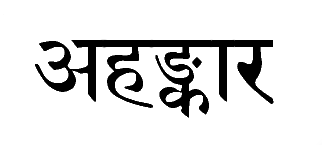 When it comes to identity, we try to find something that we are, somewhere we can plant our flag and say: “This is me. ” The verb ‘to be’ implies a stationary, fixed quality. For instance, “I am a radio show host” has a very different quality from “I host a radio show.” The words ‘I am’ imply that whatever follows is a fixed quality of being, not something that comes and goes.
When it comes to identity, we try to find something that we are, somewhere we can plant our flag and say: “This is me. ” The verb ‘to be’ implies a stationary, fixed quality. For instance, “I am a radio show host” has a very different quality from “I host a radio show.” The words ‘I am’ imply that whatever follows is a fixed quality of being, not something that comes and goes.
Nothing Personal: Seeing beyond the illusion of a separate self, Nirmala, Endless Satsang Foundation, 2001. ISBN 978-0-6151-8767-9. Buy from Amazon US, Buy from Amazon UK

I do not know where the author is heading in this paragraph and will take the quote as it is posted, i.e. without knowing the context.
The following comment is just a slightly different perspective on the difference between and similarity of the two statements “I am a radio show host” and “I host a radio show”.
First of all it is identification that makes for a statement to express ego. Identification can be as much with the status of the host as it can be with the action of hosting.
The reason for the appearance of fixedness in the first statement has to do with the verb to be. Anything we find here in this world is mithya, meaning it is name and form based on Brahman. In its essence it is nothing but Brahman alone. This is what scriptures tell us.
It is possible to logically verify this statement. Is-ness, being or existence is the one thing common to all phenomena in the world. Brahman shines as sat in all that is. As existence it is shared by all and therefore is formless (even though expressing in various forms). What is formless cannot be in motion, so it is fixed.
Even someone who does not know about this, let alone about Brahman, may unconsciously borrow this fixedness by using the verb ‘to be’ instead of using a verb that implies motion – in order to express the importance that he attributes to his assertion. By so doing, someone very identified with his job may rather choose to say “I am a radio show host”, in the attempt to lend his work a substantiality that it does not have. He is following sat while talking about something that is merely mithya.
Yes, “it is identification that makes for a statement to express ego”. The logical analysis you make of the two examples or putative statements is correct, in my view.
The ‘aham’ is stable, unmoving, while the ‘kara’ is changeable; this is the ‘nature of things’, due, that is, to a mutual superimposition of self and not self. While the individual being, jiva, can be attracted to or think of so many objects to identify with, the permanent identification, or identity, with the Self (unconscious, unacknowledged as it usually is) is always there, giving a kind of reassurance to it. Is that not the reason why most everybody is content with what s/he is, not wishing to occupy the place – as an ‘organic’ person, or even as a ‘unique personality’ – of anybody else? Ultimately everyone is I, the only subject there is (Eka… being away from home, I don’t have my books with me).
Every person is unique (Atman); it is the ‘personality’ (kara) what gets in the way.